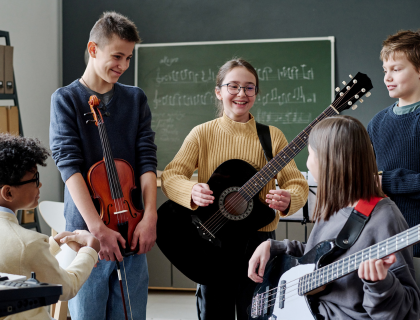The Perks of Attending a Junior Boarding School by Audrey Thorne
The idea of sending your child to boarding school, whether it is down the street or halfway around the world, can be stressful. These doubts grow when we start thinking about allowing your child to leave even earlier for Junior Boarding School. So, what makes it worth it for so many families? And why might junior boarding school actually be the right choice for your family?

Preparation for Success in Senior Boarding School and College
The most common reason students want to participate in a Junior Boarding School is because they want help building the skills to succeed at a top senior boarding school and gain entrance into a top college.
Senior Boarding schools and colleges generally do not “baby” their students. They expect students to come in with a certain level of maturity, organizational skills, drive, and self-regulation. If your child struggles to manage their time, focus on doing their work, advocate for themselves when they need help in class, speak in class discussions, clean up after themselves, and maintain healthy friendships, then the transition to Senior Boarding School may be challenging. In Crimson’s Rise program, especially our Foundations class, we help students develop some of these organization and self-advocacy skills. However, there is a limited amount that can be done while living at home.
At Junior Boarding School, they scaffold the process of mastering these important skills, communicate actively with families, and build individualized extra help into students’ schedules. As a result, Junior Boarding School students are better prepared to do well in Senior Boarding Schools. Senior Boarding Schools know this and generally accept students from strong Junior Boarding Schools at higher rates. __ means that if you want your child to get accepted to a top Senior Boarding School and rise the ranks of that boarding school to become a top contender for a top college, Junior Boarding School may be an important intermediary step.
If you are not sure whether or not your child is likely to grow into these skills without a Junior Boarding program, meet with one of our Boarding and Day School Admissions Strategists for a free consultation.
Most of the Top 30 Boarding Schools also do not offer English Language Learner courses. Students can study English outside of a Junior Boarding School; however, the 24/7 English immersion environment (and the tried and true methods used at Junior Boarding School) are very helpful in expediting students’ progress in the English language.
Rapid Skill Development
They explicitly teach students how to manage their time, organize their belongings, prepare for class, advocate for themselves, speak in class discussions, conduct research, lead, show respect to others, and deal with conflict.
Access to More Extracurriculars
In Junior Boarding School, students have access to a wide variety of sports, arts, service opportunities, publications, and leadership opportunities. Many students choose to attend a Junior Boarding School either because they want this access to either a specific activity that isn’t available where they live (like baseball or American football), or because they want the opportunity to explore many more activities.
Junior Boarding Schools actively look for open-minded, curious students who are eager to try new activities and engage with their classmates. The happiest and most academically successful Junior Boarding School students are those who take advantage of the many offerings on campus.
Teaching Style
Your child may want a more creative and engaging learning style than is available at their current school. Sometimes students struggle to do well in their middle school classes because they are entirely lecture, independent work, and/or testing. These students set themselves up better for acceptance to a top Senior Boarding School by attending a Junior Boarding School first, which teaches in their preferred style (engaging discussions, projects, essays, etc.).
Your child may earn top grades at their current school, but resent the way lessons are taught. If so, you can decide together whether it is worth going to Junior Boarding School for a more enjoyable learning experience sooner or waiting until Senior Boarding School.
Your child may deeply understand the content of their coursework and feel unbothered by the way classes are taught but yearn for more challenging classes. If there are no schools with higher academic rigor in your area, Junior Boarding School may be the best opportunity to strengthen your child’s passion for learning before it is snuffed out and help them reach their full potential.
Challenges at Home
Sometimes there are situations that make it very challenging to have your child live with you at home. For those families, Junior Boarding School is an excellent option.
Answers to Common Junior Boarding Concerns
Families express many concerns while considering Junior Boarding School: How will I know that they are safe? Who will help them when they struggle academically, socially, or emotionally? Will it really be worth losing the time I would otherwise have with them at home? Won’t we have to go through the application process again for Senior Boarding School?
Junior Boarding Schools like Indian Mountain School, Rectory School, Fay School, and Fessenden have comprehensive academic support on campus, nurses, health and wellness counselors, active advisors, caring teachers, and supportive upperclassmen mentors to help students get through any academic, social, or emotional challenges. Unlike Senior Boarding Schools, they are in frequent contact with families. Some schools, like Rumsey, even have live cameras streaming sports games so that you can watch your child’s game from wherever you are in the world.
Top Junior Boarding Schools are pipelines to top Senior Boarding Schools. Senior Boarding Admissions Officers know the transition to Senior Boarding School is often smoother. Top Junior Boarding Schools have advisors on campus who are well versed in that application process and know the odds of your child’s acceptance to any given boarding school based on how they perform at that top Junior Boarding School (the odds are generally better than applying from top international schools). Teachers are trained in how to write particularly strong letters of recommendations.
If you do not want to go through applications twice, there are a few schools that go from 6th or 7th grade through 12th grade. For example, The Webb School allows students to board starting in 6th grade and stay through 12th grade. Students there do not have to worry about applying to a Senior Boarding School later, though they still have the opportunity to move in 9th grade if they would like.
Overall, Junior Boarding School is not right for every family, but reach out to use if you think it may be the right choice for yours. We are happy to help you talk through your options. Book a free consultation here
Last Articles
What happens in a consultation?
- Learn what the application process might require for your child to reach their dream independent school.
- Review customized service package and pricing options based on your specific needs.
- Understand the typical time commitment required from your child for activities like extracurriculars to strengthen their application profile over time.
- Assess your child's current application strengths and areas that may need further development.




%20(45).png)
%20(42).png)

%20(39).png)





















%20(21).webp)



